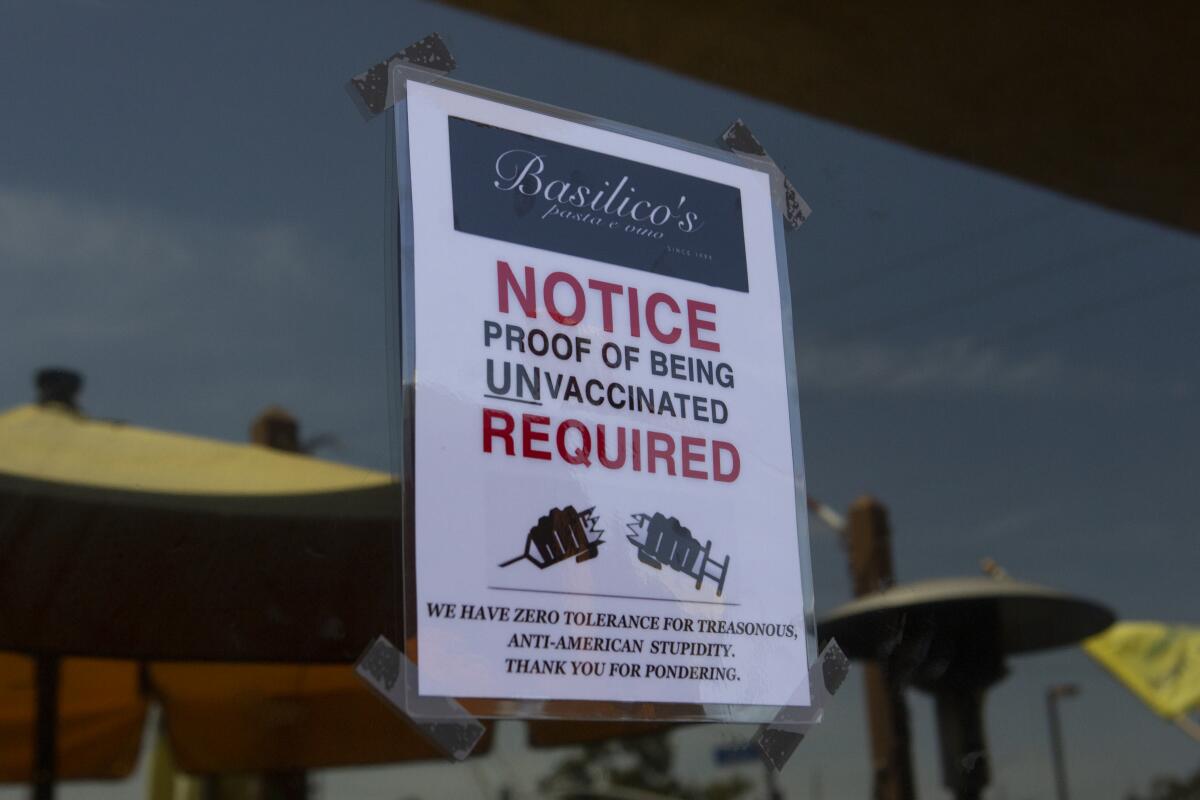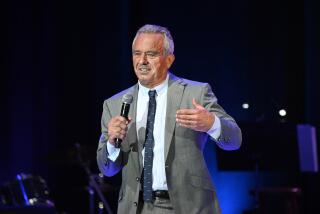Column: Separate restaurants for vaccinated and not? It may come to that

- Share via
First the restaurant was a mask-free zone.
Now it’s a vaccination-free zone, per the sign in the window.
My first thought when reading the latest news about Basilico’s Pasta e Vino restaurant in Huntington Beach was that the joint ought to be shut down by health officials, and owner Tony Roman ought to be fined. There shouldn’t be a problem paying it, because as the Orange County Register reported, the restaurant received $57,738 in government paycheck protection funds while defying safety guidelines.
But on second thought, maybe Roman is on to something.
Some people, let’s face it, may never be persuaded to get their “Fauci Ouchies,” even with an alarming surge in coronavirus cases due to the highly contagious Delta variant. They don’t trust the science or the government, or they don’t like being told what to do. So why not let them eat at their own restaurants and keep the risk of infections to themselves?
Instead of letter grades, as we have in the windows of Los Angeles restaurants for health and safety ratings, let’s have big signs in every window, V for vaccinated and U for unvaccinated. If you want to eat at a V restaurant, you’ve got to show proof that you got the shots. And we could do the same with other businesses, air travel and cruise ships.
Not that we should give up entirely on those who, at the moment, are saying no to the jab. As The Times reported, California saw a 5% increase in vaccinations in the third week of June, so there’s hope.
Two weeks ago, when I wrote about the fact that 99% of the new infections are among unvaccinated people and said we can quickly limit the spread with more cooperation, I got pushback from hundreds of readers. But I’m happy to take another stab at it.
One reader told me he’s vaccinated but his younger family members are hesitant, and he asked me what I think he should tell them.
I would tell them they’re being cut out of the will for being so selfish. If they get sick and pass it on to him, he could take ill and even die, so why not err on the side of caution? The new variant is so highly contagious, even people who are vaccinated can get “breakthrough” infections, which is one reason we’re all being encouraged to wear masks again, even if we’re immunized.
Multiple readers told me they are vaccine-hesitant because a government-run site, the Vaccine Adverse Event Reporting System (VAERS), has reported more than 12,000 deaths and many more thousands of side effects caused by vaccines.
This is not true.
Anyone can report information to the site, including non-medical professionals, so that’s a problem. And the site makes clear that the numbers do not establish cause and effect:
“VAERS reports alone cannot be used to determine if a vaccine caused or contributed to an adverse event or illness. The reports may contain information that is incomplete, inaccurate, coincidental, or unverifiable. In large part, reports to VAERS are voluntary, which means they are subject to bias.”
I asked UCLA epidemiologist Timothy Brewer about this, and here’s what he had to say:
“If you go out and vaccinate 160 million people, which we’ve done, there are some number of them who would die around the time they get their vaccine. But that doesn’t mean the vaccine has anything to do with the death.”
I heard from readers who believe the VAERS numbers are alarming, but at the same time they don’t trust the government’s accounting of the number of people who have tested positive for the coronavirus or died of COVID-19. Those numbers, they insist, are exaggerated. Go figure.
If anything, Brewer said, the death toll may have been underestimated.
“The Institute of Health Metrics estimates that COVID-19-associated mortality may be more than twice the reported number, not inflated as suggested,” Brewer said. “It is common for public health agencies to revise statistics over time.”
Brewer also refuted an argument I’ve heard over and over from readers — that we simply don’t know if COVID-19 vaccines are safe over the short or long term.
“There are now a number of population-based studies of different COVID-19 vaccines that have been published. These studies involve tens to hundreds of thousands of individuals and include information on both vaccine effectiveness … and vaccine safety,” Brewer said. “The vaccines remain both safe and effective, even against the Delta and Alpha strains, the two most widely circulating strains in the U.S. at this time.”
One reader wrote to say I should be ashamed of myself for fueling “disgusting media and government hysteria” and creating unnecessary panic.
“COVID-19 is the flu and millions have had it and recovered just fine,” said the writer. “Mass vaccination risks harming thousands more.”
Brewer’s response?
“The writer is correct that the COVID-19 case fatality rate hovers around 1% to 2%. However, the CDC estimates that the case fatality rate of the 2009 H1N1 influenza virus, our last influenza pandemic, was about 0.02%, or about 100 times lower. SARS-CoV-2 is not like our typical influenzas,” he said, referring to the virus that causes COVID-19.
None of those who argued that vaccines can kill seemed to recognize the likelihood that they have been lifesavers.
“A Yale School of Public Health modeling study estimates that COVID-19 vaccines have prevented 279,000 deaths and 1.25 million hospitalizations in the U.S. alone,” Brewer said. “Recognizing the limitations of modeling studies, it is still safe to say that COVID-19 vaccines have been a tremendous success in saving lives and preventing serious disease here and elsewhere.”
Until more people believe that, we could take Tony Roman’s lead and draw a line between the vaccinated and the unvaccinated.
But rather than be so cynical, I’m not giving up hope that rational thinking will ultimately prevail, and here’s why:
Years ago, when writing about climate change, I got relentless pushback from deniers who refuted the overwhelming scientific evidence.
Today, with catastrophic drought, extreme heat and flooding around the globe, I seldom hear from the doubters. If they’ve wised up, maybe there’s hope for the anti-vaxxers.
More to Read
Sign up for Essential California
The most important California stories and recommendations in your inbox every morning.
You may occasionally receive promotional content from the Los Angeles Times.











